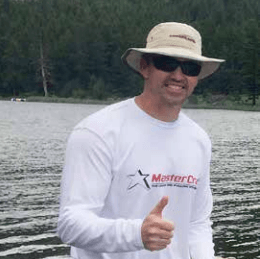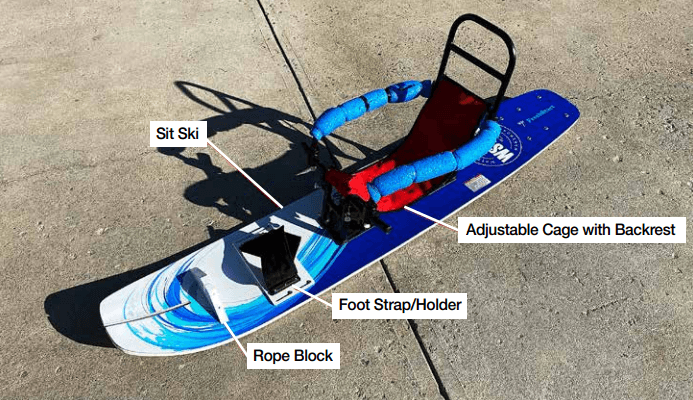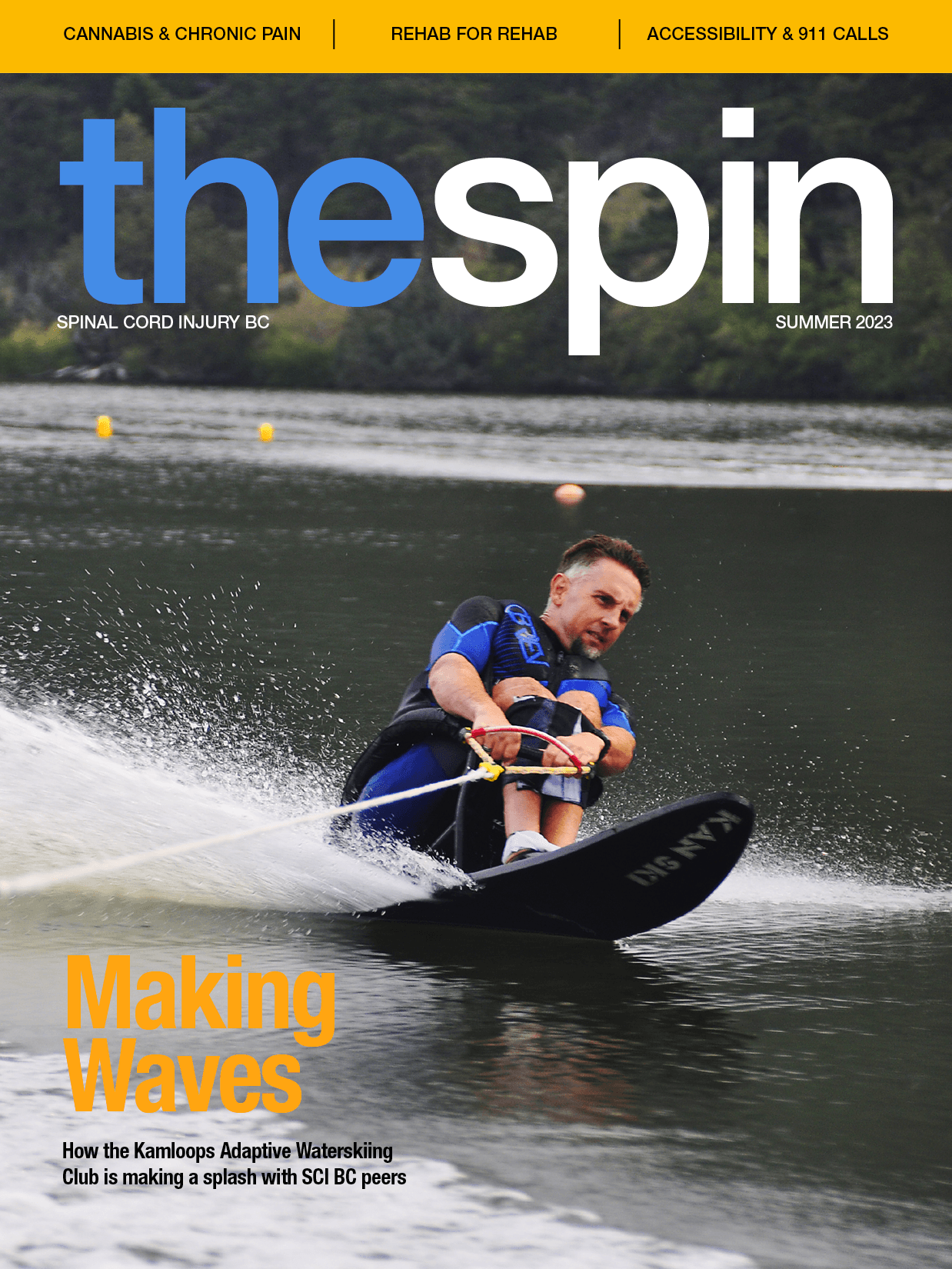
Resourcefulness is something SCI BC Peers know a thing or two about. How can I find a way to reach that top shelf? How could I improve the fit of my chair? How can I modify my car to start driving again? After an SCI, being resourceful almost becomes second nature. Whether it’s to solve everyday problems, get back to something you love, or try something new – the ability to adjust to any situation is crucial. According to Paul Dixon, President of the Kamloops Waterskiing Club (KWSC), the same is true for waterskiing. “Adaptive waterskiing is all about resourcefulness [and] each participant has different needs that have to be considered and accounted for,” says Paul. And that’s exactly what KWSC aims to do for every participant that wants to give waterskiing a try.
Established in 1982, KWSC has grown from humble beginnings with a few members skiing on the Thompson River to hosting the 1993 Canada Summer Games, and eventually establishing a permanent facility on Shumway Lake. Ten years ago, KWSC evolved again to incorporate adaptive waterskiing into their regular portfolio of offerings and began hosting clinics for interested participants. “The very first skier we got up and out of the water and skiing on their own was amazing and really set the tone for the clinic and the resulting success we have had,” Paul recounts. Since then, the Club has facilitated annual summer clinics for people with all types of physical or intellectual disabilities. For people with SCI, Paul notes that a range of beginner to advanced skis are available, with beginner skis offering more balance and stability while advanced skis cater to speed and more aggressive turns.

Each ski comes equipped with a seating frame (also known as a cage) that allows skiers to be supported while moving across the water. These cages vary in size and height to accommodate people’s needs and every clinic starts with an orientation session to get familiar with the equipment and find the proper fit. Once you’ve found the perfect ride and appropriate life jacket, your turn behind the boat is accompanied by an able-bodied side skier from KWSC, who will instruct you with the basics, and an NCCP certified SkiAbility coach will also be in the boat to ensure that participants have the best chance of success as possible. In addition, there are often a number of former national team Para athletes on hand for further guidance. “The participants’ experience can be tailored to what they are comfortable with. They can be fully supported the entire time or they can choose to be let go so they can try on their own and practice turning,” Paul explains. “It’s one of the few sports that you can judge how well you are doing versus the week, month, or year prior.” As participants build confidence in their skills, there are opportunities to advance beyond recreation.
Rob Gosse, an SCI BC peer who first took to the water in 2007 knows firsthand what it’s like to try the sport and advance to the next level. After a spinal cord injury in 2006, Rob was determined to get back to his active lifestyle and take part in the activities his children loved. This desire led him first to para-alpine skiing, where he competed provincially and on the North American circuit, and eventually transitioned to adaptive waterskiing. “My first experience waterskiing … we had two pulls around the bay on a beautiful summer day—sun was shining, I was in my glory,” Rob recalls. “[Since then] I had always wanted to figure out a way to get more days out on the water and to be able to do it more than once a year. In 2009 I bought my boat, had bought a slalom ski, and I found some friends to be able to pull me behind my boat to be able to go for a ski whenever I wanted.” His passion and skill for the sport quickly grew and Rob made the Canadian National team in 2014 where he competed for three years in slalom, trick, and jump events. “My favourite event is slalom,” he says. “I competed in the Worlds for disabled waterskiing in 2017 in Australia and it was such an incredible experience for me!”
Nowadays, Rob focuses less on maneuvering through buoys at impressive speeds and more on giving back to the waterskiing community that helped him experience so many things. “It means a lot for me to not only coach the athletes [but also] to be able to coach the coaches to be able to teach adaptive waterskiing. I recognized a lot of holes in the system from the grassroots to the podium and want to help bridge that gap for the athletes coming through and wanting to help them succeed in their own goals. If it is just to go for a pull around the lake,or to be able to compete and represent Canada in the Worlds,” he says.
Some of the gaps that Rob refers to include inaccessible locations and a lack of awareness. “Most waterski sites are not accessible. Kamloops is one of the few that is fully accessible. Any site I attend, I always bring my freewheel to make the experience easiest possible for me… Waterskiing isn’t well known for the adaptive community, for one reason or another,” he says. Similarly, Paul also hopes that the profile of the sport will grow along with participation. He notes that additional programs at other locations would help increase the access and visibility of the sport and highlights sessions running in Vancouver, Prince George, Alberta, and Saskatchewan. Above all, he just wants people to have the chance to experience the feeling of being out on the water. “Getting first timers up and behind the boat and on their own if capable is truly rewarding. The grins and smiles of the participants say it all.”

For our very own SCI BC Peer Program Coordinator, Tyler Tingle, getting out on the lake was all about experiencing this feeling of joy and sharing it with others. “The first clinic I went to was the first time I had water skied since before my SCI back in ‘89. I loved it and have attended all but one clinic since the inception,” he says. “I take a couple laps around the lake but love to help out someone new who hasn’t tried adaptive skiing before… We got 11 people out for the first one-day clinic,” Tyler recalls. “Everyone got up skiing that day, paras, quads, and amputees, as well as others.” This sense of accomplishment and fun led Tyler to pursue competitive waterskiing for a period and he sat on the board of KWSC while motivating others to get involved. During this time, he also attempted the mighty five-foot ski jump at KWSC clinics but after a femur break and some advice from his doctor, he ultimately decided that his passion was better suited to trying to grow the sport through his connections with the community. Now, the Kamloops resident is a board member for the Kamloops Adaptive Sports Association (KASA) and Accessible Okanagan (AO), where he encourages peers without any background in water sports to come out and give it a try.
Paul and Rob both echo this encouragement. “I had a participant who expressed to me, as we were lowering him in the water, that this was the first time since his accident [more than two years prior] that he had been in a lake,” Paul says. For KWSC, creating memories like this is often more important than learning to ski. There’s something magical about spending a summer’s day on the water, and success isn’t measured by going faster or further, but by smiles. As Rob reiterates, “To anyone that has any interest in seeing it, come out and see how it goes! [You] don’t have to ski if you don’t want to but come out and enjoy the day!”
This article was originally published in the Summer 2023 issue of The Spin. Read more stories from this issue, including:
- Cannabis and Chronic Pain
- Improving BC’s System of Rehabilitation and Recovery
- Newcomer Guide
And more!
Read the full Summer 2023 Issue of The Spin online!




